Miscellaneous papers relating to Malcolm William Keshan - Part 2 of 3
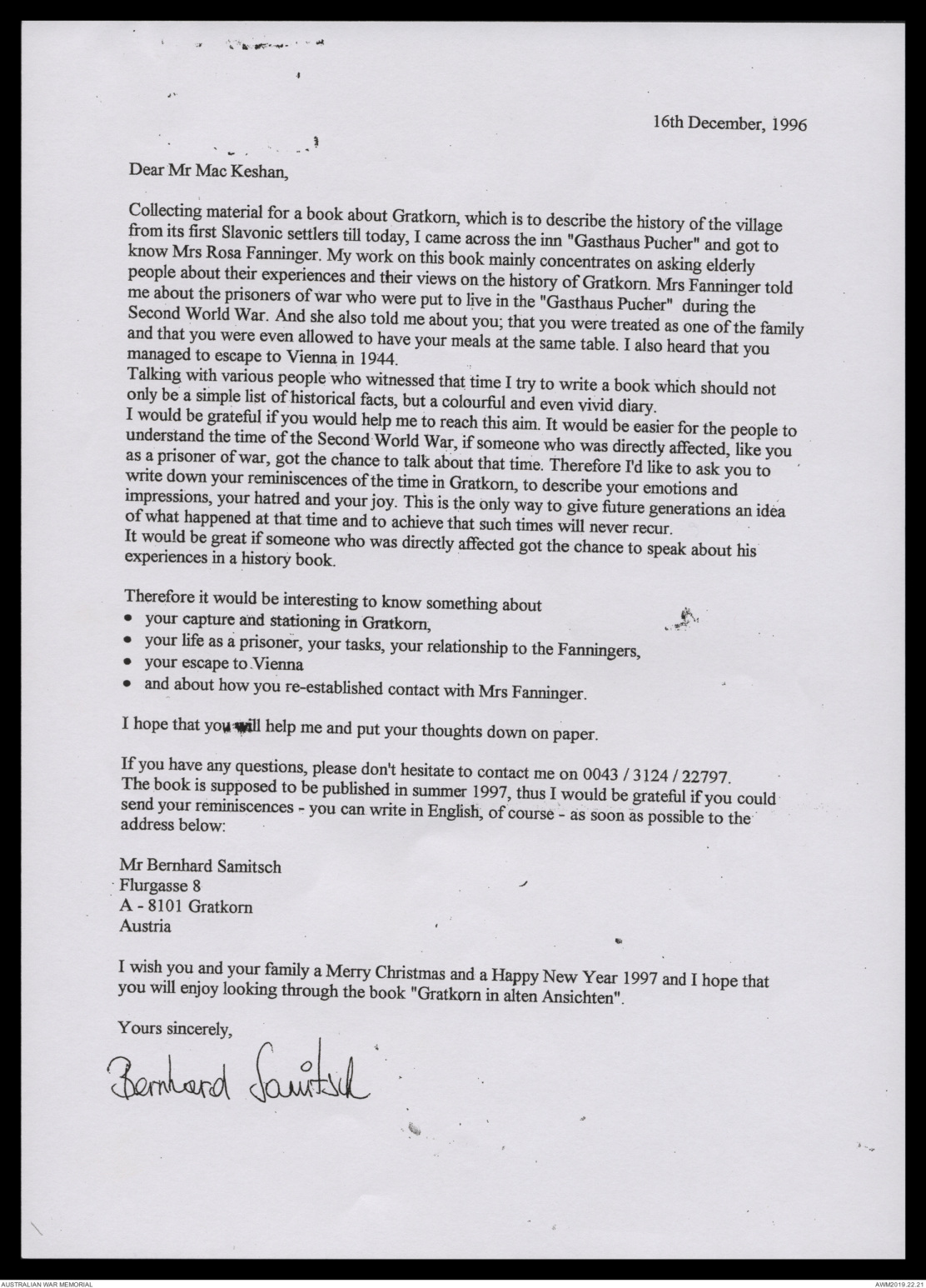
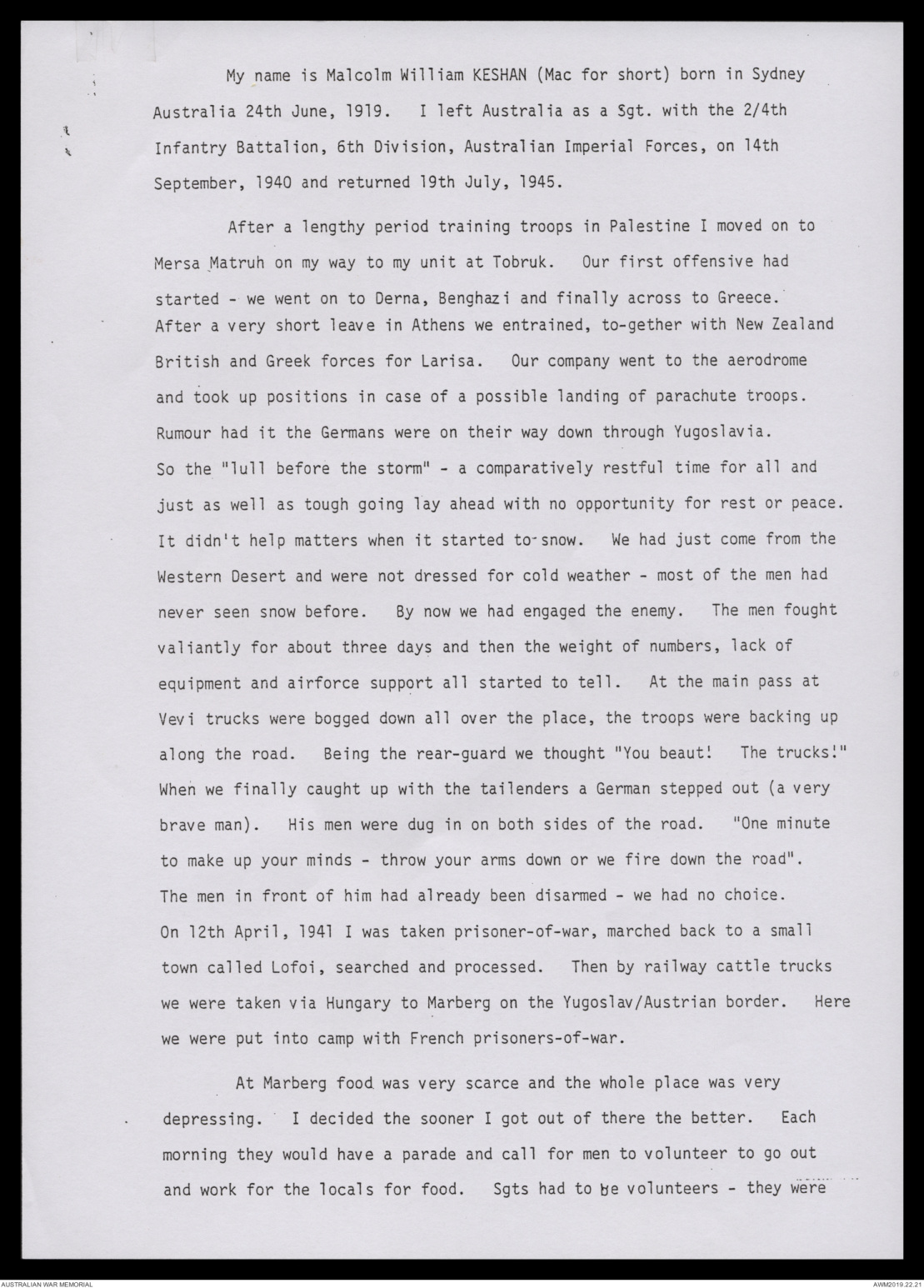
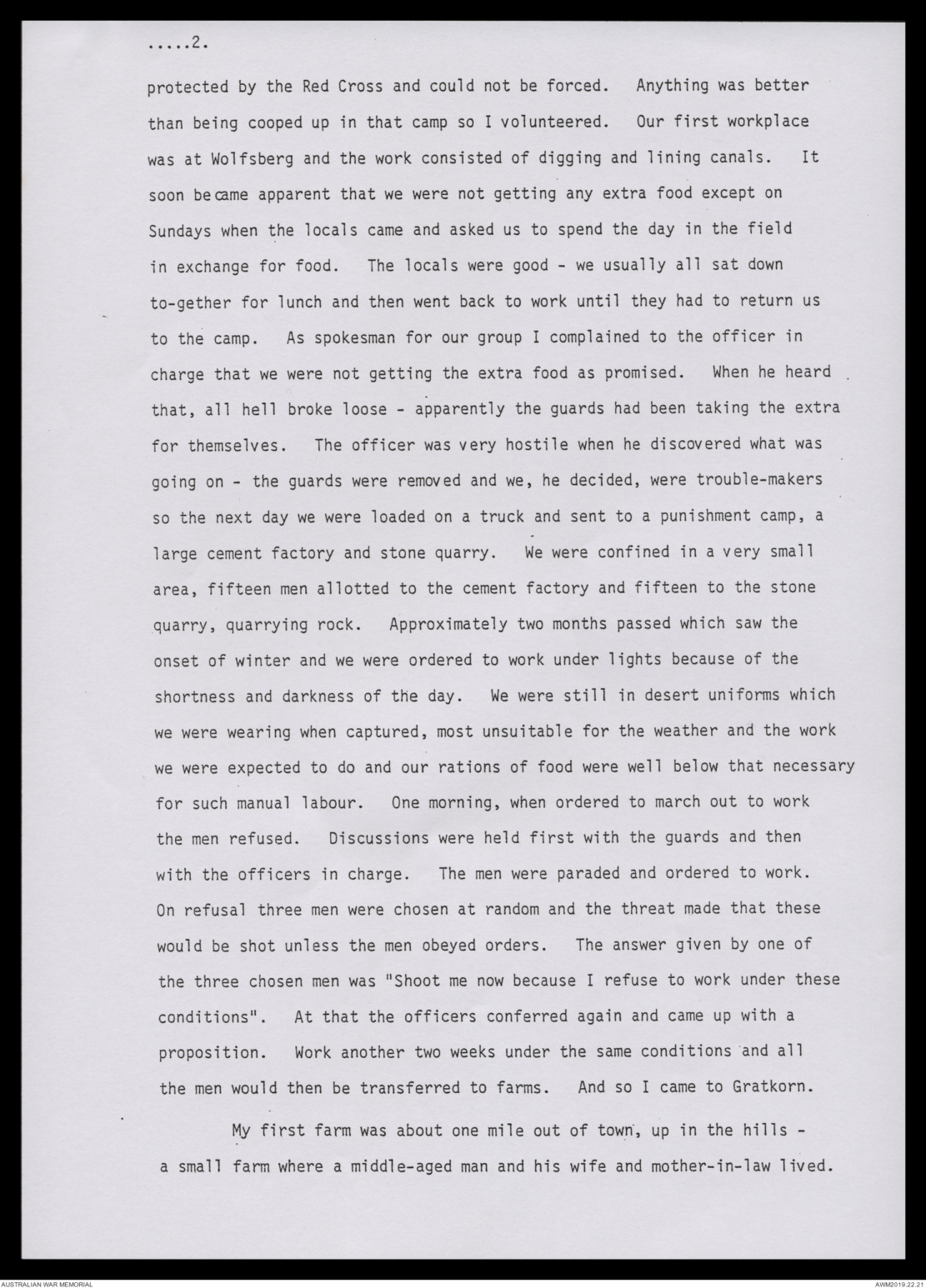

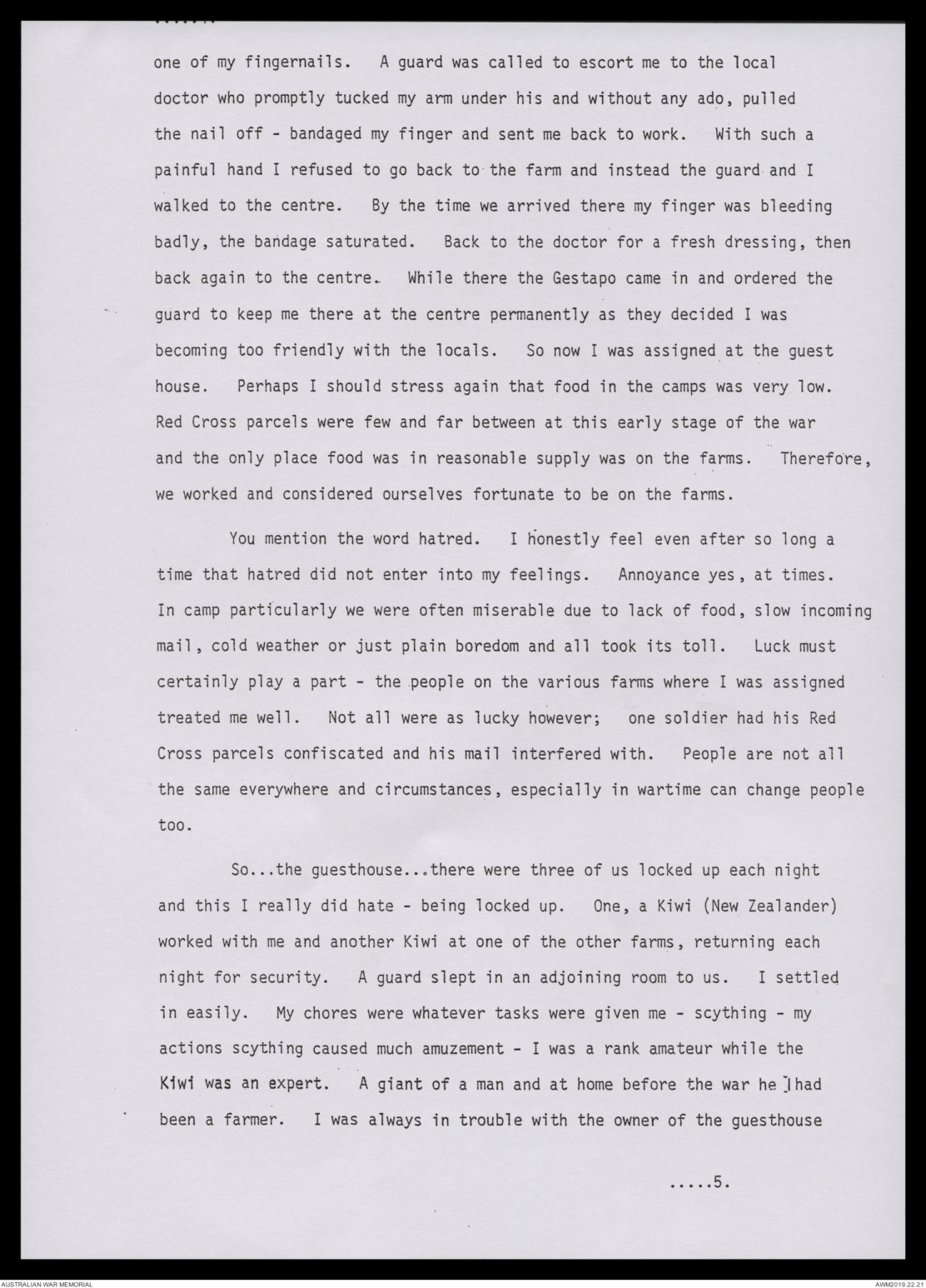

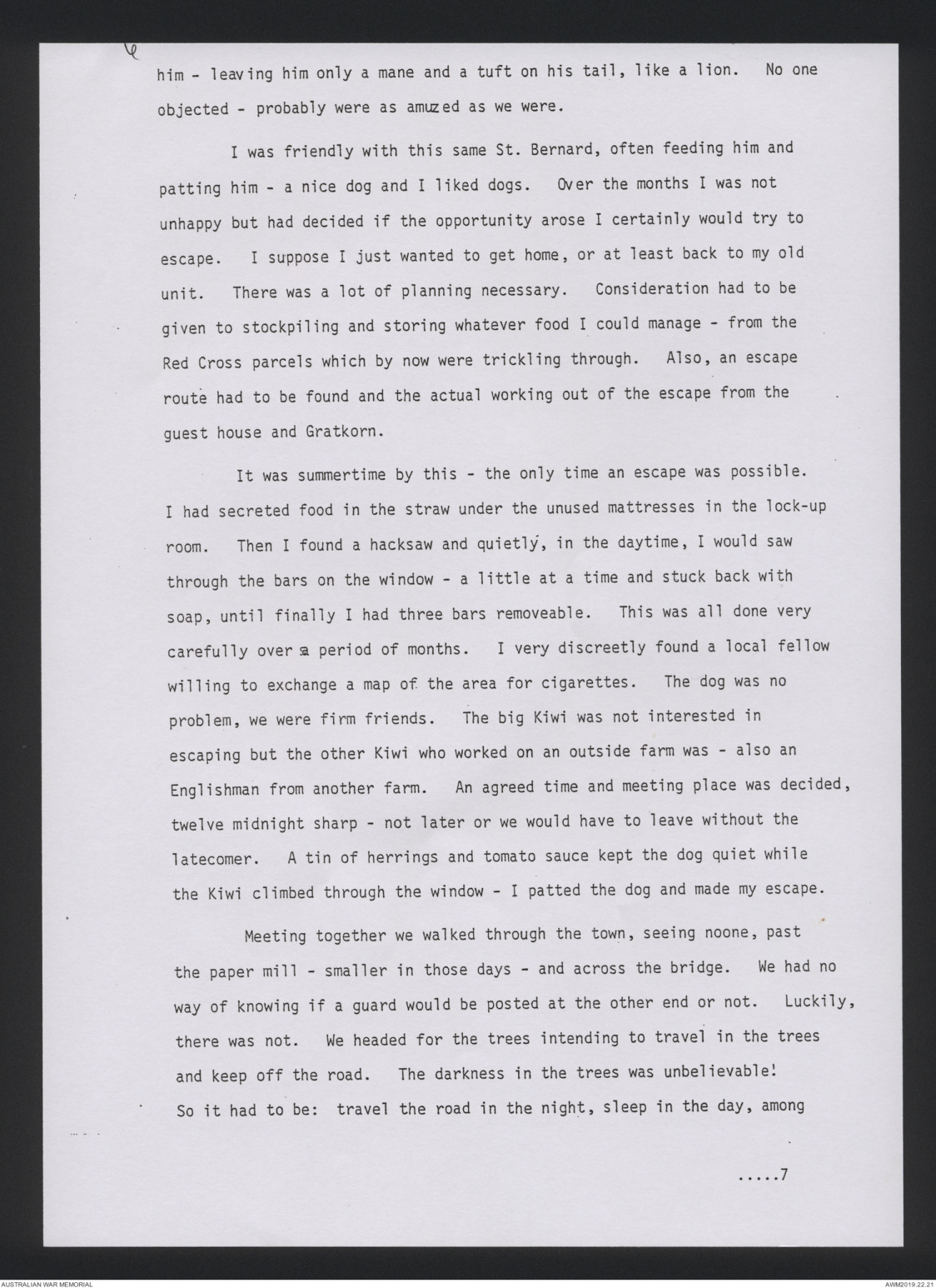
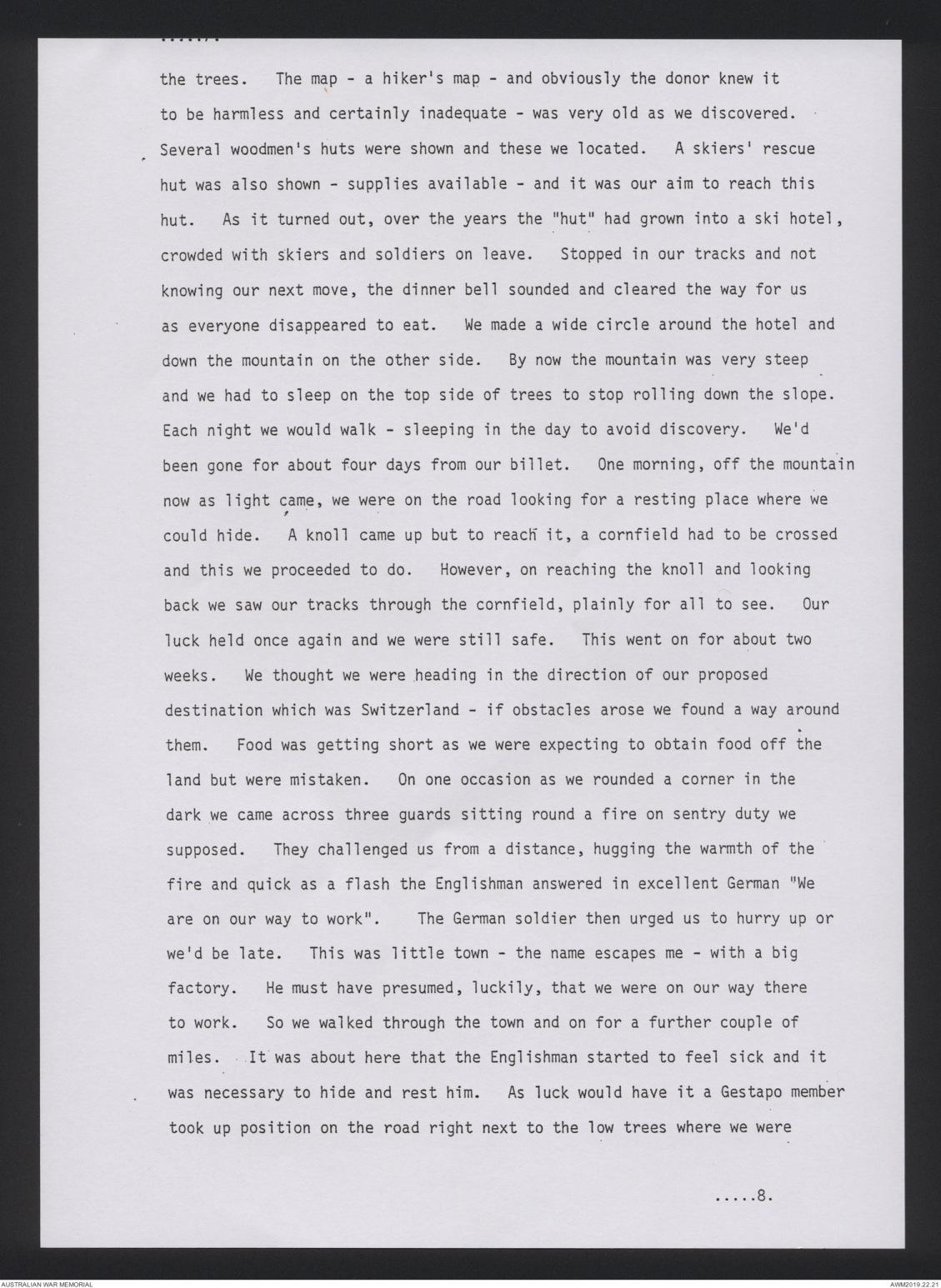
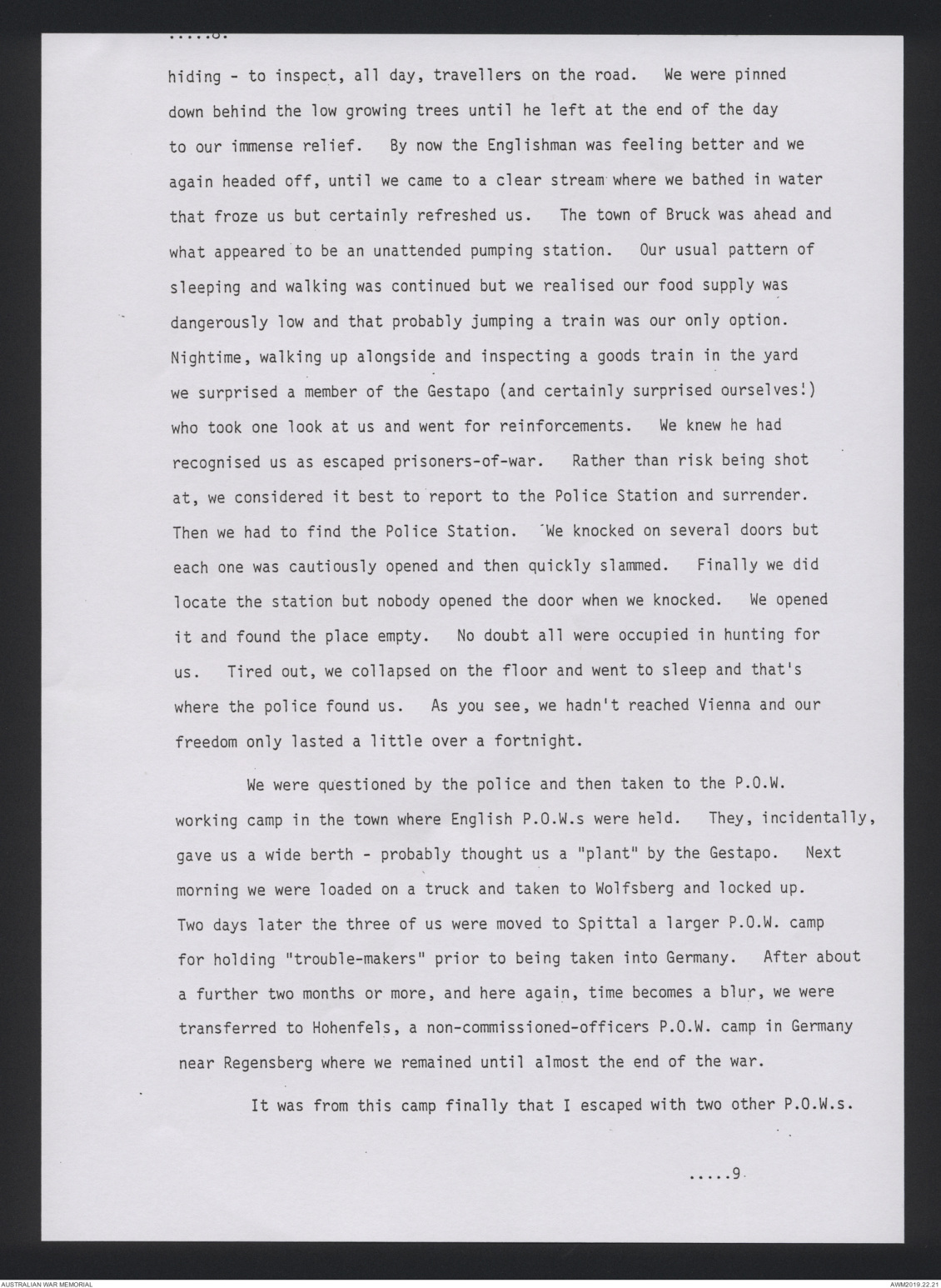
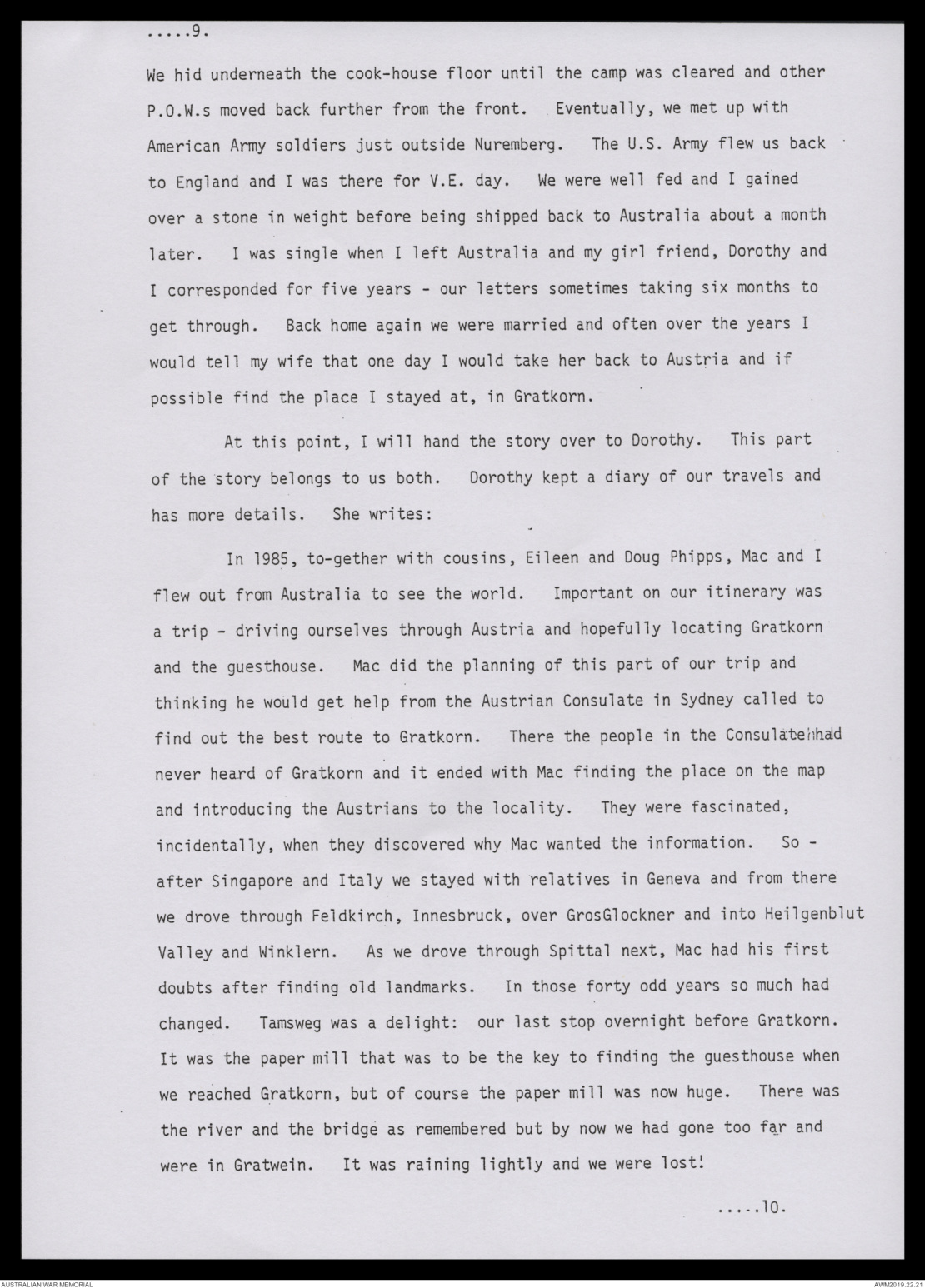
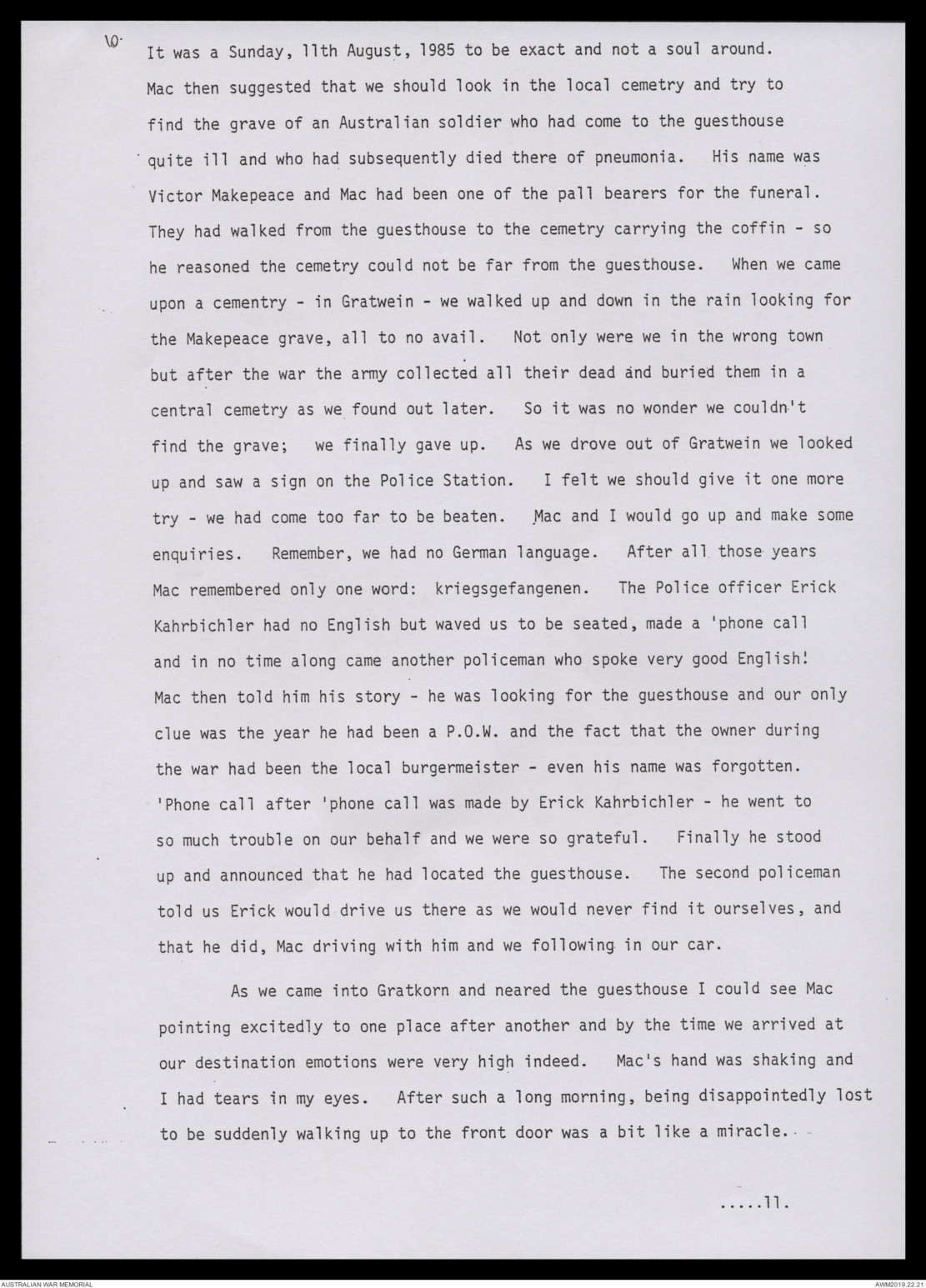
16th December, 1996
Dear Mr Mac Keshan,
Collecting material for a book about Gratkorn, which is to describe the history of the village
from its first Slavonic settlers till today, I came across the inn "Gasthaus Pucher" and got to
know Mrs Rosa Fanninger. My work on this book mainly concentrates on asking elderly
people about their experiences and their views on the history of Gratkorn. Mrs Fanninger told
me about the prisoners of war who were put to live in the "Gasthaus Pucher" during the
Second World War. And she also told me about you; that you were treated as one of the family
and that you were even allowed to have your meals at the same table. I also heard that you
managed to escape to Vienna in 1944.
Talking with various people who witnessed that time I try to write a book which should not
only be a simple list of historical facts, but a colourful and even vivid diary.
I would be grateful if you would help me to reach this aim. It would be easier for the people to
understand the time of the Second World War, if someone who was directly affected, like you
as a prisoner of war, got the chance to talk about that time. Therefore l’d like to ask you to
write down your reminiscences of the time in Gratkorn, to describe your emotions and
impressions, your hatred and your joy. This is the only way to give future generations an idea
of what happened at that time and to achieve that such times will never recur.
It would be great if someone who was directly affected got the chance to speak about his
experiences in a history book.
Therefore it would be interesting to know something about
- your capture and stationing in Gratkorn,
- your life as a prisoner, your tasks, your relationship to the Fanningers,
- your escape to Vienna
- and about how you re-established contact with Mrs Fanninger.
I hope that you will help me and put your thoughts down on paper.
If you have any questions, please don’t hesitate to contact me on 0043 /3124/22797.
The book is supposed to be published in summer 1997, thus I would be grateful if you could
send your reminiscences - you can write in English, of course - as soon as possible to the
address below:
Mr Bernhard Samitsch
Flurgasse 8
A - 8101 Gratkorn
Austria
I wish you and your family a Merry Christmas and a Happy New Year 1997 and I hope that
you will enjoy looking through the book "Gratkorn in alten Ansichten".
Yours sincerely,
Bernard Samitsch
My name is Malcolm William KESHAN (Mac for short) born in Sydney
Australia 24th June, 1919. I left Australia as a Sgt. with the 2/4th
Infantry Battalion, 6th Division, Australian Imperial Forces, on 14th
September, 1940 and returned 19th July, 1945.
After a lengthy period training troops in Palestine I moved on to
Mersa Matruh on my way to my unit at Tobruk. Our first offensive had
started - we went on to Derna, Benghazi and finally across to Greece.
After a very short leave in Athens we entrained, to-gether with New Zealand
British and Greek forces for Larisa. Our company went to the aerodrome
and took up positions in case of a possible landing of parachute troops.
Rumour had it the Germans were on their way down through Yugoslavia.
So the "lull before the storm" - a comparatively restful time for all and
just as well as tough going lay ahead with no opportunity for rest or peace.
It didn't help matters when it started to snow. We had just come from the
Western Desert and were not dressed for cold weather - most of the men had
never seen snow before. By now we had engaged the enemy. The men fought
valiantly for about three days and then the weight of numbers, lack of
equipment and airforce support all started to tell. At the main pass at
Vevi trucks were bogged down all over the place, the troops were backing up
along the road. Being the rear-guard we thought "You beaut! The trucks!"
When we finally caught up with the tailenders a German stepped out (a very
brave man). His men were dug in on both sides of the road. "One minute
to make up your minds - throw your arms down or we fire down the road".
The men in front of him had already been disarmed - we had no choice.
On 12th April, 1941 I was taken prisoner-of-war, marched back to a small
town called Lofoi, searched and processed. Then by railway cattle trucks
we were taken via Hungary to Marberg on the Yugoslav/Austrian border. Here
we were put into camp with French prisoners-of-war.
At Marberg food was very scarce and the whole place was very
depressing. I decided the sooner I got out of there the better. Each
morning they would have a parade and call for men to volunteer to go out
and work for the locals for food. Sgts had to be volunteers - they were
.....2.
protected by the Red Cross and could not be forced. Anything was better
than being cooped up in that camp so I volunteered. Our first workplace
was at Wolfsberg and the work consisted of digging and lining canals. It
soon be came apparent that we were not getting any extra food except on
Sundays when the locals came and asked us to spend the day in the field
in exchange for food. The locals were good - we usually all sat down
to-gether for lunch and then went back to work until they had to return us
to the camp. As spokesman for our group I complained to the officer in
charge that we were not getting the extra food as promised. When he heard
that, all hell broke loose - apparently the guards had been taking the extra
for themselves. The officer was very hostile when he discovered what was
going on - the guards were removed and we, he decided, were trouble-makers
so the next day we were loaded on a truck and sent to a punishment camp, a
large cement factory and stone quarry. We were confined in a very small
area, fifteen men allotted to the cement factory and fifteen to the stone
quarry, quarrying rock. Approximately two months passed which saw the
onset of winter and we were ordered to work under lights because of the
shortness and darkness of the day. We were still in desert uniforms which
we were wearing when captured, most unsuitable for the weather and the work
we were expected to do and our rations of food were well below that necessary
for such manual labour. One morning, when ordered to march out to work
the men refused. Discussions were held first with the guards and then
with the officers in charge. The men were paraded and ordered to work.
On refusal three men were chosen at random and the threat made that these
would be shot unless the men obeyed orders. The answer given by one of
the three chosen men was "Shoot me now because I refuse to work under these
conditions". At that the officers conferred again and came up with a
proposition. Work another two weeks under the same conditions and all
the men would then be transferred to farms. And so I came to Gratkorn.
My first farm was about one mile out of town, up in the hills -
a small farm where a middle-aged man and his wife and mother-in-law lived.
3
My duties covered most chores, helping cows to calve, killing pigs, cutting
wood, beating wheat over a log and then sifting it through a sieve, husking
corn and so on. I was on friendly terms with all the family and ate with
them at meal-times. We managed with signs to cope with absence of a mutual
language. Length of time spent here escapes me. I should mention that to
be eligible for a P.O.W. to assist with labour there had to be a "lock-up"
for the night. At this farm there was an outhouse. I was learning their
way of life, so different from my own home life and apart from being locked
up at night I enjoyed the life. I was released from work on Sundays - using
the day to collect mail from the centre which was the guest house and to catch
up with my army mates. Occasionally I would visit another farm where a
friend worked, mainly for conversation. I have fond memories of walking
in the snow with the first farm-owner, leading a cow to be served at a
neighbouring farm. I mention this particularly as I am city born and bred
with no farming experience at all - until then. Snow was foreign to me and
the companionship of the farmer who asked me to go along with him was pleasant.
I remember, too, eating my first piece of black "cake" - quite a tasty
experience until I realised it contained pig's blood - I'd helped the farmer
to kill a pig that morning.
My reason for leaving this farm was because the farmer's wife
decided I should work on Sunday, to which I objected in no uncertain terms.
Very annoyed, she said she was boss and I would work. The outcome of the
argument was my departure from the farm - I walked off, back to the centre
and much to the horror of the guard there. Next morning I was reassigned
to a very old couple on the main road near the town. They had about six
heifers which I was required to feed, grinding up pumpkins, corn, whatever.
Chores were few and time was heavy on my hands. I took to sitting on the
front fence and whistling passing girls. No conversation mind you, just
plenty of smiles and laughter. At this farm my meals were prepared for me
but I always ate alone.
I remember well, I caught my finger in the grinding machine and tore
. . . . .4.
one of my fingernails. A guard was called to escort me to the local
doctor who promptly tucked my arm under his and without any ado, pulled
the nail off - bandaged my finger and sent me back to work. With such a
painful hand I refused to go back to the farm and instead the guard and I
walked to the centre. By the time we arrived there my finger was bleeding
badly, the bandage saturated. Back to the doctor for a fresh dressing, then
back again to the centre. While there the Gestapo came in and ordered the
guard to keep me there at the centre permanently as they decided I was
becoming too friendly with the locals. So now I was assigned at the guest
house. Perhaps I should stress again that food in the camps was very low.
Red Cross parcels were few and far between at this early stage of the war
and the only place food was in reasonable supply was on the farms. Therefore,
we worked and considered ourselves fortunate to be on the farms.
You mention the word hatred. I honestly feel even after so long a
time that hatred did not enter into my feelings. Annoyance yes, at times.
In camp particularly we were often miserable due to lack of food, slow incoming
mail, cold weather or just plain boredom and all took its toll. Luck must
certainly play a part - the people on the various farms where I was assigned
treated me well. Not all were as lucky however; one soldier had his Red
Cross parcels confiscated and his mail interfered with. People are not all
the same everywhere and circumstances, especially in wartime can change people
too.
So...the guesthouse...there were three of us locked up each night
and this I really did hate - being locked up. One, a Kiwi (New Zealander)
worked with me and another Kiwi at one of the other farms, returning each
night for security. A guard slept in an adjoining room to us. I settled
in easily. My chores were whatever tasks were given me - scything - my
actions scything caused much amuzement - I was a rank amateur while the
Kiwi was an expert. A giant of a man and at home before the war he had
been a farmer. I was always in trouble with the owner of the guesthouse
. . . . .5.
5
who was the Burgermeister of the town in those days. The Kiwi - I've
forgotten his name - was a man who had to be working all the time. If
we were sent to do a job he would insist on me sitting down while he did
the job. I didn't need too much persuasion I'll admit but I always seemed
to be caught. One of my jobs was to cut the wood and carry it into the
house for Rosi Faninger's mother. Again we had no mutual language but I
must have met with her approval as I received many smiles from her. I would
join the rest in gathering and stacking hay, as I said, whatever jobs I was
asked to do. There are clear memories of a little old fellow - in charge
of handling two stallions which were his pride and joy. At times if he
was sick it would be Rosi who would do his job. I took my meals in the house
with Rosi, Paula - another young girl who worked there - a middle aged quiet
man, the old stallions handler and the big Kiwi. In fact, except for being
locked up at night I was treated as a family member.
Rosi and I had many discussions - arguments even - about Australia.
Rosi doubted the size of some of our properties/stations/farms in Australia
and many the time the discussion would end with her saying "When my brother
comes home he will argue with you". Rosi's brother was in the Air Force.
As in all life there were always funny incidents. Sitting on the
cellar step one morning I saw a horse and sulky driven by an Australian P.O.W.
on his way to the railway station on an errand. I offered him a drink of
cider and after a chat he invited me to take a ride in the sulky. And why
not? Driving to the station, sitting up, as we would say "like Jacky"
we passed several local soldiers and their friends - walking. Here were we -
two prisoners of war riding in style (and in those days riding in a sulky was
riding in style) while our captors had to walk. Even they had a good laugh
at the incongruity of the situation. And no, I hadn't been missed by the
people in charge at the guest house. Then there was the time - summer was
on the way - and the St. Bernard dog at the guesthouse was feeling the heat.
So we asked Rosi could we shear his coat and she agreed. The Kiwi sheared
. . . . .6.
6
him - leaving him only a mane and a tuft on his tail, like a lion. No one
objected - probably were as amuzed as we were.
I was friendly with this same St. Bernard, often feeding him and
patting him - a nice dog and I liked dogs. Over the months I was not
unhappy but had decided if the opportunity arose I certainly would try to
escape. I suppose I just wanted to get home, or at least back to my old
unit. There was a lot of planning necessary. Consideration had to be
given to stockpiling and storing whatever food I could manage - from the
Red Cross parcels which by now were trickling through. Also, an escape
route had to be found and the actual working out of the escape from the
guest house and Gratkorn.
It was summertime by this - the only time an escape was possible.
I had secreted food in the straw under the unused mattresses in the lock-up
room. Then I found a hacksaw and quietly, in the daytime, I would saw
through the bars on the window - a little at a time and stuck back with
soap, until finally I had three bars removeable. This was all done very
carefully over a period of months. I very discreetly found a local fellow
willing to exchange a map of the area for cigarettes. The dog was no
problem, we were firm friends. The big Kiwi was not interested in
escaping but the other Kiwi who worked on an outside farm was - also an
Englishman from another farm. An agreed time and meeting place was decided,
twelve midnight sharp - not later or we would have to leave without the
latecomer. A tin of herrings and tomato sauce kept the dog quiet while
the Kiwi climbed through the window - I patted the dog and made my escape.
Meeting together we walked through the town, seeing noone, past
the paper mill - smaller in those days - and across the bridge. We had no
way of knowing if a guard would be posted at the other end or not. Luckily,
there was not. We headed for the trees intending to travel in the trees
and keep off the road. The darkness in the trees was unbelievable!
So it had to be: travel the road in the night, sleep in the day, among
. . . . .7
the trees. The map - a hiker's map - and obviously the donor knew it
to be harmless and certainly inadequate - was very old as we discovered.
Several woodmen's huts were shown and these we located. A skiers' rescue
hut was also shown - supplies available - and it was our aim to reach this
hut. As it turned out, over the years the "hut" had grown into a ski hotel,
crowded with skiers and soldiers on leave. Stopped in our tracks and not
knowing our next move, the dinner bell sounded and cleared the way for us
as everyone disappeared to eat. We made a wide circle around the hotel and
down the mountain on the other side. By now the mountain was very steep
and we had to sleep on the top side of trees to stop rolling down the slope.
Each night we would walk - sleeping in the day to avoid discovery. We'd
been gone for about four days from our billet. One morning, off the mountain
now as light came, we were on the road looking for a resting place where we
could hide. A knoll came up but to reach it, a cornfield had to be crossed
and this we proceeded to do. However, on reaching the knoll and looking
back we saw our tracks through the cornfield, plainly for all to see. Our
luck held once again and we were still safe. This went on for about two
weeks. We thought we were heading in the direction of our proposed
destination which was Switzerland - if obstacles arose we found a way around
them. Food was getting short as we were expecting to obtain food off the
land but were mistaken. On one occasion as we rounded a corner in the
dark we came across three guards sitting round a fire on sentry duty we
supposed. They challenged us from a distance, hugging the warmth of the
fire and quick as a flash the Englishman answered in excellent German "We
are on our way to work". The German soldier then urged us to hurry up or
we'd be late. This was little town - the name escapes me - with a big
factory. He must have presumed, luckily, that we were on our way there
to work. So we walked through the town and on for a further couple of
miles. It was about here that the Englishman started to feel sick and it
was necessary to hide and rest him. As luck would have it a Gestapo member
took up position on the road right next to the low trees where we were
. . . . .8.
hiding - to inspect, all day, travellers on the road. We were pinned
down behind the low growing trees until he left at the end of the day
to our immense relief. By now the Englishman was feeling better and we
again headed off, until we came to a clear stream where we bathed in water
that froze us but certainly refreshed us. The town of Bruck was ahead and
what appeared to be an unattended pumping station. Our usual pattern of
sleeping and walking was continued but we realised our food supply was
dangerously low and that probably jumping a train was our only option.
Nightime, walking up alongside and inspecting a goods train in the yard
we surprised a member of the Gestapo (and certainly surprised ourselves!)
who took one look at us and went for reinforcements. We knew he had
recognised us as escaped prisoners-of-war. Rather than risk being shot
at, we considered it best to report to the Police Station and surrender.
Then we had to find the Police Station. We knocked on several doors but
each one was cautiously opened and then quickly slammed. Finally we did
locate the station but nobody opened the door when we knocked. We opened
it and found the place empty. No doubt all were occupied in hunting for
us. Tired out, we collapsed on the floor and went to sleep and that's
where the police found us. As you see, we hadn't reached Vienna and our
freedom only lasted a little over a fortnight.
We were questioned by the police and then taken to the P.O.W.
working camp in the town where English P.O.W.s were held. They, incidentally,
gave us a wide berth - probably thought us a "plant" by the Gestapo. Next
morning we were loaded on a truck and taken to Wolfsberg and locked up.
Two days later the three of us were moved to Spittal a larger P.O.W. camp
for holding "trouble-makers" prior to being taken into Germany. After about
a further two months or more, and here again, time becomes a blur, we were
transferred to Hohenfels, a non-commissioned-officers P.O.W. camp in Germany
near Regensberg where we remained until almost the end of the war.
It was from this camp finally that I escaped with two other P.O.W.s
. . . . . 9
. . . . . 9.
We hid underneath the cook-house floor until the camp was cleared and other
P.O.W.s moved back further from the front. Eventually, we met up with
American Army soldiers just outside Nuremberg. The U.S. Army flew us back
to England and I was there for V.E. day. We were well fed and I gained
over a stone in weight before being shipped back to Australia about a month
later. I was single when I left Australia and my girl friend, Dorothy and
I corresponded for five years - our letters sometimes taking six months to
get through. Back home again we were married and often over the years I
would tell my wife that one day I would take her back to Austria and if
possible find the place I stayed at, in Gratkorn.
At this point, I will hand the story over to Dorothy. This part
of the story belongs to us both. Dorothy kept a diary of our travels and
has more details. She writes:
In 1985, to-gether with cousins, Eileen and Doug Phipps, Mac and I
flew out from Australia to see the world. Important on our itinerary was
a trip - driving ourselves through Austria and hopefully locating Gratkorn
and the guesthouse. Mac did the planning of this part of our trip and
thinking he would get help from the Austrian Consulate in Sydney called to
find out the best route to Gratkorn. There the people in the Consulate had
never heard of Gratkorn and it ended with Mac finding the place on the map
and introducing the Austrians to the locality. They were fascinated,
incidentally, when they discovered why Mac wanted the information. So -
after Singapore and Italy we stayed with relatives in Geneva and from there
we drove through Feldkirch, Innesbruck, over GrosGlockner and into Heilgenblut
Valley and Winklern. As we drove through Spittal next, Mac had his first
doubts after finding old landmarks. In those forty odd years so much had
changed. Tamsweg was a delight: our last stop overnight before Gratkorn.
It was the paper mill that was to be the key to finding the guesthouse when
we reached Gratkorn, but of course the paper mill was now huge. There was
the river and the bridge as remembered but by now we had gone too far and
were in Gratwein. It was raining lightly and we were lost!
. . . . . 10.
10
It was a Sunday, 11th August, 1985 to be exact and not a soul around.
Mac then suggested that we should look in the local cemetry and try to
find the grave of an Australian soldier who had come to the guesthouse
quite ill and who had subsequently died there of pneumonia. His name was
Victor Makepeace and Mac had been one of the pall bearers for the funeral.
They had walked from the guesthouse to the cemetry carrying the coffin - so
he reasoned the cemetry could not be far from the guesthouse. When we came
upon a cementry - in Gratwein - we walked up and down in the rain looking for
the Makepeace grave, all to no avail. Not only were we in the wrong town
but after the war the army collected all their dead and buried them in a
central cemetry as we found out later. So it was no wonder we couldn't
find the grave; we finally gave up. As we drove out of Gratwein we looked
up and saw a sign on the Police Station. I felt we should give it one more
try - we had come too far to be beaten. Mac and I would go up and make some
enquiries. Remember, we had no German language. After all those years
Mac remembered only one word: kriegsgefangenen. The Police officer Erick
Kahrbichler had no English but waved us to be seated, made a 'phone call
and in no time along came another policeman who spoke very good English!
Mac then told him his story - he was looking for the guesthouse and our only
clue was the year he had been a P.O.W. and the fact that the owner during
the war had been the local burgermeister - even his name was forgotten.
'Phone call after 'phone call was made by Erick Kahrbichler - he went to
so much trouble on our behalf and we were so grateful. Finally he stood
up and announced that he had located the guesthouse. The second policeman
told us Erick would drive us there as we would never find it ourselves, and
that he did, Mac driving with him and we following in our car.
As we came into Gratkorn and neared the guesthouse I could see Mac
pointing excitedly to one place after another and by the time we arrived at
our destination emotions were very high indeed. Mac's hand was shaking and
I had tears in my eyes. After such a long morning, being disappointedly lost
to be suddenly walking up to the front door was a bit like a miracle.
. . . . .11.
 Jacqueline Kennedy
Jacqueline KennedyThis transcription item is now locked to you for editing. To release the lock either Save your changes or Cancel.
This lock will be automatically released after 60 minutes of inactivity.